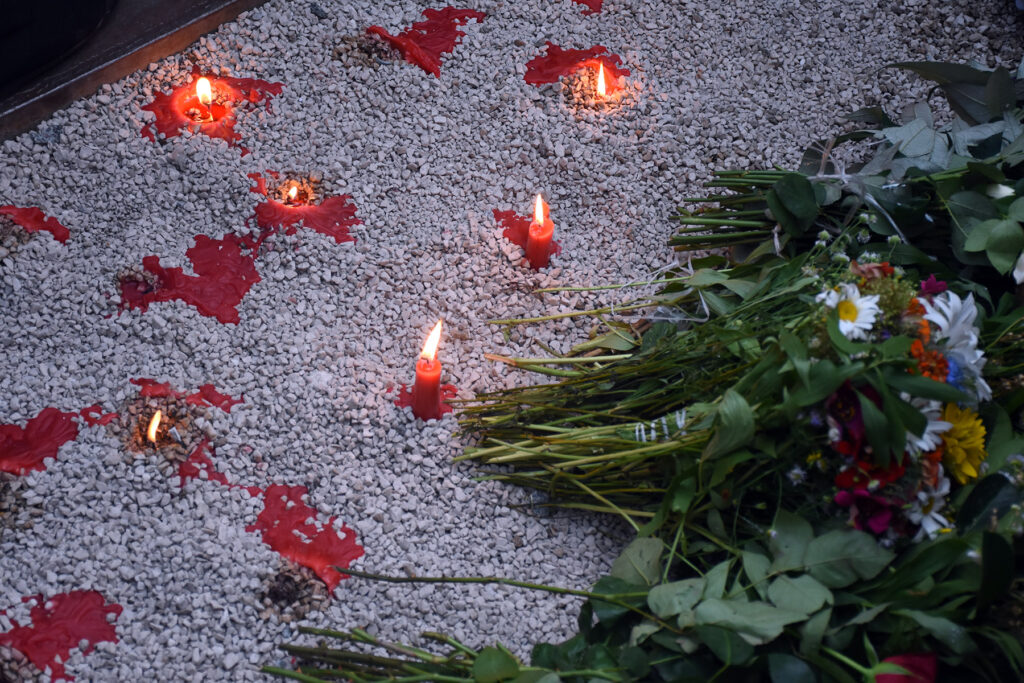Calls have mounted for the resignation of Georgian Prime Minister Irakli Gharibashvili as well as the Interior Minister, Vakhtang Gomelauri, following the death on Sunday morning of journalist Aleksandre Lashkarava.
Lashkarava, a camera operator at TV Pirveli, was attacked by a mob during the homophobic riots in Tbilisi on 5 July, which left at least 53 journalists injured. He sustained fractures to his facial bones and a concussion, and on Sunday morning, he was found dead in his home.

Several thousand people gathered outside Parliament in central Tbilisi on Sunday demanding the PM and Interior Minister stand down. Protests were also held in Batumi, Kutaisi, Zugdidi, Gori, Akhaltsikhe, and Telavi.
Twenty leading Georgia-based civil rights organisations also released a joint statement calling for their resignation.

The government has faced accusations of inaction and even complicity in the riots in the capital on 5 July.
As the violence started unfolding, Gharibashvili made a statement against the Pride march planned for that day while the Interior Ministry called on Tbilisi Pride to cancel their public demonstration.
Despite the violence continuing throughout the day, the Interior Ministry did not deploy a significant number of police officers to the streets and on several occasions, officers stood by as journalists were attacked.

Before protests began on Monday over Lashkarava’s death, 77 media outlets, including OC Media, signed a joint statement calling for the international community to respond to the violence against journalists.
[Read from OC Media: Editorial | A state-sanctioned attack on Georgia's free press]
Several media organisations and liberal group the Shame Movement have vowed to renew their protests on Monday unless their demands for resignations are met.
Government hints at drug-related death
The Georgian Government has avoided taking responsibility for the circumstances surrounding Lashkarava’s death.
Despite the ruling Georgian Dream party convening for hours on Sunday, the party made no major announcements.



During two press conferences, an Interior Ministry spokesperson claimed that they were looking into all possible scenarios regarding Lashkarava’s death. However, the ministry focused on details of Lashkarava’s movement in the hours prior to his death, strongly suggesting that it may have been drug-related.
Specifically, the official investigation made public the route of his movement, including two visits to Ponichala, an area often associated with illegal drugs. They also claimed that he had been intoxicated upon returning home hours before his death.
The statements, which came before any preliminary forensic medical examination had been completed, were accompanied by footage allegedly showing Lashkarava stumbling outside his house.

Church and far-right remain unrepentant
Criticism has also been levelled against the Georgian Orthodox Church, which was the main organiser of the 5 July anti-Pride protests.
The Church made several statements against the Pride march and blamed the homophobic and anti-media violence which followed on the organisers, as well as foreign embassies that supported them.


Following Lashkarava’s death, the Chuch made no official statements nor offered public condolences to his family and colleagues. However, several high-ranking members of the clergy infuriated critics on Sunday making comments downplaying his death. .
After facing questions regarding Lashkarava’s death and whether the clergy were complicit in the violence, Ioane Gamrekeli, the Metropolitan of the Kutaisi-Gaenati Diocese, ended up threatening a journalist. Gamrekeli was also recently caught in the centre of the anti-semitism scandal.
‘You got smacked once and you are going to get smacked again', Gamrekeli told Irakli Vachiberadze, a reporter from TV channel Mtavari.

In an anti-Western rant on Facebook, Bishop Anton Bulukhia downplayed Lashkarava’s death after government critics suggested that a more robust police response should have followed the violence on the streets on 5 July.
‘One journalist died and you're making such a story, and [imagine] what would have happened during mass riots’, Bulukhia wrote on the Facebook page of his diocese.
Georgian far-right groups, who were also active in organising the protests on 5 July, also remained defiant.
On 11 July, Levan Vasadze, a Georgian businessman and prominent far-right figure, blamed US Ambassador to Georgia Kelly Degnan and her support for Pride events for Aleksandre Lashkarava’s death.

On 11 July, the website of Alt Info, an extremist group and broadcaster that organised counter-demonstration against the opening event of Tbilisi Pride week on 1 July and were also instrumental in attacks on 5 and 6 July, became unreachable.
OC Media have reached out to the hosting company to clarify if they suspended service to the group due to reports by the activists.
[Read more on OC Media: Georgia’s Trump-loving alt-right begin broadcasting on TV]




 12 July 2021
12 July 2021



